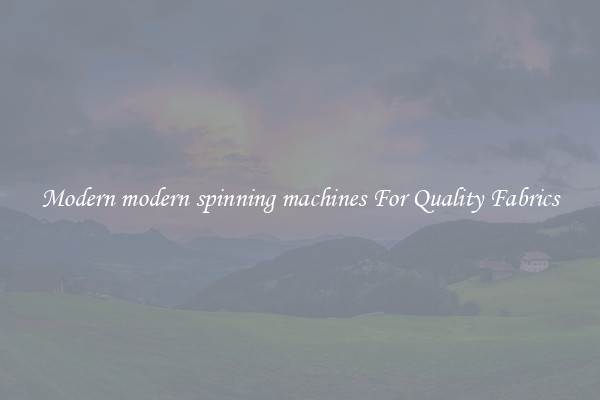Modern modern spinning machines For Quality Fabrics
Modern spinning machines have revolutionized the textile industry by increasing the efficiency and quality of fabrics produced. These machines are designed with advanced technology to ensure that the fabrics produced meet the high standards demanded by consumers.

One of the key features of modern spinning machines is their ability to produce fabrics with consistent and uniform yarns. This is achieved through precise control of spinning parameters such as speed, tension, and twist, which results in fabrics that are free from defects and variations in yarn thickness. This consistency is crucial for producing high-quality fabrics that are durable and have a smooth and even texture.
Another advantage of modern spinning machines is their ability to produce a wide range of fabrics with different characteristics. These machines can easily switch between different yarn types, counts, and finishes, allowing textile manufacturers to create fabrics that meet the specific requirements of their customers. Whether it is a fine and delicate fabric for evening wear or a sturdy and durable fabric for workwear, modern spinning machines can produce it all.
Furthermore, modern spinning machines are equipped with monitoring and control systems that ensure the quality of the fabrics produced. These systems continuously monitor parameters such as yarn tension, temperature, and speed, and automatically make adjustments to maintain optimal production conditions. This not only helps in minimizing waste and rejections but also ensures that the fabrics meet the desired quality standards.
In addition to quality, modern spinning machines also offer increased productivity and cost-efficiency. These machines are designed to operate at high speeds and with minimal downtime, resulting in higher production rates and lower manufacturing costs. This is especially important in today's competitive textile industry, where manufacturers need to produce high-quality fabrics at competitive prices to stay ahead in the market.
Overall, modern spinning machines have significantly contributed to the advancement of the textile industry by producing high-quality fabrics that meet the demands of today's consumers. With their advanced technology, these machines ensure consistency, versatility, and efficiency in fabric production, making them an essential tool for textile manufacturers looking to stay competitive in today's market.

View details

View details

View details

View details








